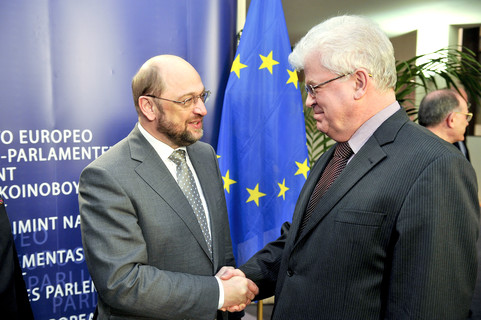[ad_1]
Statements, literary quotes, and jokes, but no action – that is how the EU handled Russia’s decision to blacklist its highest official.
The Russian move “lacks any legal justification and is entirely groundless”, the EU foreign service said on behalf of member states.
It was “unfounded in substance” and strained relations “in an unnecessary way”, the German foreign ministry added.
It was “unacceptable”, the presidents of the EU Council, European Commission, and European Parliament also said in a joint statement.
They all spoke after Moscow, on Friday (30 April), imposed a travel ban on European Parliament president David Sassoli – who is the EU’s highest official in protocol terms.
Moscow did the same to Věra Jourová, an EU commissioner, and six minor officials from Estonia, France, Germany, Latvia, and Sweden.
It did so after the EU recently blacklisted six Russians for human rights abuses.
But while Europe’s sanctions were based on evidence that can be challenged in the EU courts, Russia’s ones were based on a brief statement which hardly made sense.
The EU was trying “to impose a unilateral concept of a ‘rules-based world order,’ something that undermines international law”, the Russian foreign ministry said.
Meanwhile, the EU member states added: “The EU reserves the right to take appropriate measures in response to the Russian authorities’ decision”.
But they had done nothing as of Monday.
A normal reaction would have been for the EU foreign service to immediately summon Russia’s EU ambassador, Vladimir Chizhov, for a formal reprimand.
But Chizhov has never been embarrassed in this way in the 15 years he has held his post in Brussels – not even when Russia invaded Georgia in 2008 and Ukraine in 2014.
“People are kind of fascinated by him and afraid of him – they play his game. A meeting with Chizhov is seen as a rare prize in their [EU officials’] otherwise dull, bureaucratic lives. That’s why he’s never been summoned,” an EU diplomat said.
“If they don’t do it now, they look like utter cowards,” he added.
“Every time [Russia does something malign], I think: ‘Now’s the time. Now the EU will use the power of the 27 [member states] to punch back’. And every time I’m unpleasantly surprised,” a second EU diplomat said.
And all that left Sassoli and Jourová to rely on their wits instead.
“Threats will not silence us. As Tolstoy wrote, there is no greatness where there is no truth,” Sassoli tweeted.
“I am pleased to be in such good company,” Jourová joked, referring to the other seven targets.
For his part, Guy Verhofstadt, a Belgian liberal MEP, noted that he and dozens of other European officials have been on Russia’s no-entry list “for years”.
But Russia usually keeps its list quiet, to maximise annoyance when people land there only to be turned back.
The EU sanctions dispute comes amid a more serious Nato one over Russia’s bomb attacks in Bulgaria and the Czech Republic in recent years.
Just four Nato allies have so far ejected just seven Russian diplomats in solidarity with the Czechs.
Meanwhile, MEPs voted by a whopping majority (569 against 67) last Thursday for a “coordinated expulsion” of Russians at the EU level, in a non-binding resolution.
[ad_2]
Source link
